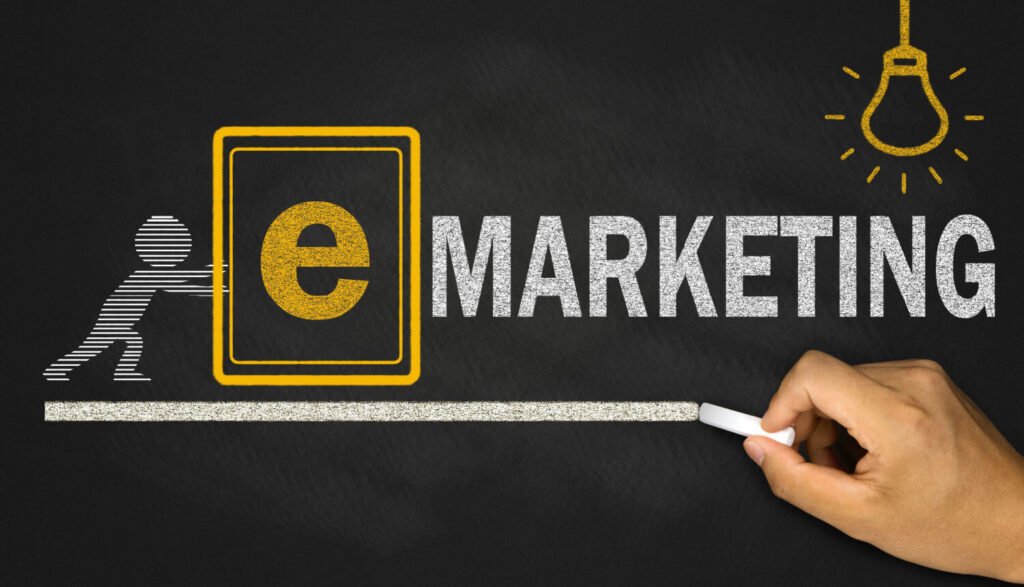Incorporating e-marketing into a company’s overall marketing strategy is crucial in today’s digital age. Thanks to email, websites, and other new technologies, businesses now have more flexibility and improved ways to market their goods and services to customers.
If you are curious about e-marketing and how it can benefit your marketing efforts, this guide will help you explore what e-marketing is, why it is essential, and dive into six cost-effective e-marketing types to help you reach your audience and increase revenue.
What is E-Marketing?
E-marketing, also referred to as internet marketing, online marketing, or digital marketing, is the all-encompassing term for marketing activities a business conducts using electronic devices or the internet.
Through the use of modern technologies and media, e-marketing aims to attract new customers, retain existing ones, and establish a strong brand identity.
It is a complementary approach to traditional marketing methods, and businesses of all sizes can use it to reach their target audience and meet their marketing objectives.
To achieve these objectives, businesses have access to a vast range of online tools that can be customized to fit their specific needs, products, capacity, and target market.
What are the Main Types of E-Marketing?
While referrals remain the top source of traffic, search engines remain a vital avenue for customer acquisition, particularly in competitive, price-sensitive markets.
The big three search engines, Google, Yahoo, and Bing, contribute to over 90% of all referrals to e-commerce sites. However, only 10% of web users bother browsing beyond the second page of search results, making securing a high ranking critical.
Businesses expecting significant commercial returns should consider investing in professional SEO services. Conversely, small companies with limited budgets may opt for a DIY approach.
E-marketing offers several types of strategies to reach a target audience and promote products or services effectively.
Here are some of the most common types:
1. Search Engine Optimization (SEO)
Search engine optimization (SEO) is the practice of optimizing website content, such as design and content, to rank higher in search engine results pages (SERPs) for specific keywords or phrases to increase visibility and organic traffic.
Creating valuable and relevant content that aligns with a user’s search query can significantly improve your website’s visibility and accessibility to potential customers through search engine recognition and recommendations.
This is why content optimization is a critical component of SEO strategies businesses can use to enhance their online presence and attract more qualified leads.
By leveraging relevant keywords and high-quality content, you can establish your website as a reliable source of information that offers solutions to your target audience‘s needs and pain points, thus increasing the likelihood of conversions and revenue growth.
2. Pay-per-click (PPC) Advertising
PPC advertising is an effective e-marketing strategy that enables businesses to purchase advertising space on search engines and other websites to drive clicks and visits to their site.
The best part? You only pay for the clicks you receive through platforms like Google AdWords, making it more budget friendly than traditional advertising methods.
It is crucial to craft ad copy that speaks to your audience and choose relevant keywords to target to get the most out of your PPC campaigns.
The cost of running an ad or promoting your search results will depend on the competitiveness of your chosen keywords. High-competition keywords are more expensive, while low-competition keywords are more affordable.
PPC ads can appear on search result pages, while browsing the web, before YouTube videos, and on social media platforms, allowing businesses to reach a wider audience.
When executed strategically, PPC can significantly increase traffic to a specific site or page, boost conversion rates, and help businesses achieve their objectives.
Unlike SEO, PPC requires you to pay for results, making it a great way to manage costs while still driving traffic to your site.
3. Social Media Marketing (SMM)
Social media marketing has become indispensable for businesses seeking to reach out to their customers and promote their brands. Unlike traditional forms of advertising, SMM is low-cost, with most platforms allowing companies to create profiles for free.
In addition to generating sales, SMM experts use social media to build brand awareness, increase engagement, collect market research, and celebrate their organization’s achievements.
A successful SMM strategy requires consistency, interaction with the audience, and engaging posts. Ensuring that every piece of content serves a specific purpose or solves a particular problem is essential to maximize the effectiveness of your SMM.
SMM examples include Facebook, Instagram, LinkedIn, Twitter, Reddit, and other platforms that can help you connect with your target audience.
4. Email Marketing
Email marketing is a targeted approach to marketing a product or service via email to a subscriber list or database of prospects.
The key to successful email marketing is to segment the email lists and craft personalized correspondences that can lead to higher conversion rates.
It is important to note that modern email marketing focuses on consent, segmentation, and personalization, as sending mass emails that “fit all” is no longer effective.
Instead, businesses can build a community around their brand through a well-designed email marketing strategy.
Marketers should aim to improve two metrics for email marketing software:
- Open rates,
- Click-through rates.
Examples of popular platforms used to manage and send emails include Mailchimp, Constant Contact, and HubSpot. These can be used to send customers or subscribers different types of messages, covering weekly newsletters, limited-time offers, and new product updates.
5. Content Marketing
Content marketing is a strategic approach to e-marketing that involves producing, publishing, and distributing content to reach and engage a targeted online audience.
The objective is to promote brand awareness by telling a compelling story and providing valuable information that encourages the reader to take action, such as requesting more information or subscribing to an email list.
Some content marketing examples include:
- Blog posts,
- White papers,
- E-books,
- Podcasts,
- Articles,
- Case studies.
Rather than focusing solely on selling a product, businesses use this approach to provide relevant and consistent information that appeals to their target audience.
It is particularly effective because search engines like Google favor websites with high-quality content. Therefore, to enhance your search engine rankings and improve your online visibility, producing engaging and informative content is crucial.
By creating content that resonates with your target audience, you can establish your brand as a credible source of information, making it easier for potential customers to discover and engage with your business.
This way, you can attract more traffic to your website and increase your chances of generating leads and conversions.
6. Affiliate Marketing
Affiliate marketing is a popular e-marketing strategy that involves three parties:
- The product owner,
- The affiliate marketer,
- The end consumer.
The affiliate marketer chooses a product from the owner and then promotes it using various techniques, such as blogs, videos, or advertisements.
Finally, the consumer can buy the product online using a particular link supplied by the affiliate, often at a discounted price.
The affiliate marketer receives a predetermined commission on each sale in return for their efforts.
This strategy offers businesses a inexpensive way to reach a wider audience, increase brand awareness, and drive sales, resulting in a higher return on investment (ROI) and significant business growth. It is a win-win strategy for all parties involved.
What are the Benefits of E-Marketing?
E-marketing is a preferred solution for marketing professionals due to the internet’s transparency, allowing real-time access to analytics and data.
Several benefits of e-marketing make it a popular choice for businesses of all sizes. These include:
- Instant response: The response rate of internet marketing is almost instantaneous, making it possible for a post to go viral overnight and reach millions.
- Cost-efficient: Compared to other forms of advertising, it is much cheaper, especially when using unpaid methods, as there is almost zero cost.
- Less risky: Since no financial investment is involved, it is less risky than other forms of marketing.
- Greater data collection: It allows businesses to collect valuable customer data that can be used later.
- Interactive: This type of marketing is highly interactive and allows people to leave comments, providing businesses with feedback from their target market.
- Personalized marketing: Digital marketing opens the door to customized marketing, making customers feel like the ad is directly talking to them.
- Greater exposure to products or services: Going viral with one post can deliver greater exposure to products or services.
- Accessibility: Internet marketing is accessible globally, making it a convenient and effective way to reach a wider audience.
With greater exposure, personalized marketing, and interactive opportunities, e-marketing is a powerful tool to help businesses reach their marketing goals.
Supercharge Your Business with Tailored E-Marketing Strategies
Want to connect with your target market and generate more leads? E-marketing is a powerful tool that can help you do just that! Creating content for multiple channels and reaching more prospective leads can add value to your business.
At LeadIn Media, we specialize in developing and implementing tailored e-marketing strategies to help you connect with your audience, generate leads, and grow your business.
Our team will work closely with you to understand your unique business needs and create a customized plan that fits your budget and goals. To learn more about how we can help you achieve success with e-marketing, contact us today.




